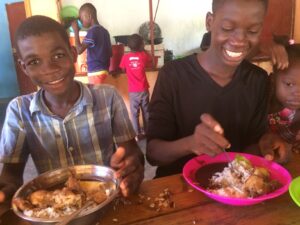This update is about the food that the foundation provides to our children Monday-Friday and a survey I did with our children to compare what they eat at the foundation vs what they eat at home.
I did a survey of all the kids at the JRF about how many times they eat meat at home each week. The highest answer was 4, which was openly questioned by the other children, the lowest 0 and the average was about 1.3 times. When they do eat meat it isn’t like they get two pieces of chicken or a whole chicken breast, they usually get a piece of the meat from a chicken leg or other small morsel. Just about all the kids polled have parents who have jobs with Good Threads, most Haitians don’t even have jobs, much less jobs that pay them a salary that is equivalent of a teacher or nurse’s salary. The vast majority of JRF kids eat every night at home and eat 3 meals on the weekends, if you were to poll an average set of lower class Haitian children the question would be how many times a week do you eat period, not how often do you eat meat as that answer would be less than 1.
 Moisnika, who has been in the JRF since age 3 with a partially eaten plate.
Moisnika, who has been in the JRF since age 3 with a partially eaten plate.
At the foundation we serve them either plantains with beans and a big piece of meat or a big bowl of rice and beans with a big piece of meat, they also get a piece of Avocado when in season. I eat the same lunch as the kids with one exception, I get more Avocado. The cooks used to try to give me two pieces of chicken with my lunch but I felt that was too greedy and put a stop to it. I did not ask for extra Avocado, they just give it to me because they love me or because I pay their salary, I haven’tput a stop to it. I just love Avocado with my rice and beans and there has to be some benefit to being the boss, lord knows it isn’t my salary. Hopefully this isn’t the first step down the slippery slope of corruption.
 My plate of food and Avocado serving, Exhibit A of Corruption at the JRF
My plate of food and Avocado serving, Exhibit A of Corruption at the JRF
The children’s answer to how often they eat meat at home also is skewed by the fact that none of their parents spend money feeding them lunch Monday-Friday or pay their school tuition or books, as the foundation does all of that. The way people save for school or rent payments is by cutting back on food for a few months. They will give their kids sugar water a few days a week instead of food and the savings over a period of months will be enough to pay tuition or rent. You can see the influence the protein at the foundation has on the children by looking at the older and younger children. The teenage boys who have only been with us for a few years are generally quite gangly and overly skinny and most will already have had their growth stunted by a lack of protein. The kids who have grown up in the foundation or been with us long-term are far thicker as they have had a significant amount of protein in their diet their whole lives.
 Starving is a hard concept for most Americans to internalize as it is not part of our lives or society. We know there are hundreds of millions if not billions of people that go hungry every day but we are generally not able to internalize what that means as most of us do not see it or experience it. There are some people in the US who will miss a meal here and there, but we are probably the only nation in history whose lower class has a problem with obesity. Between food stamps, food pantry’s, free lunch at school, soup kitchens and friendly neighbors or family, just about everyone manages to eat at least once or twice a day if not three times. This is not the case in Haiti, a huge percentage of the population regularly go full days without eating and when they do eat it is often just white rice without anything in it or a piece of bread.
Starving is a hard concept for most Americans to internalize as it is not part of our lives or society. We know there are hundreds of millions if not billions of people that go hungry every day but we are generally not able to internalize what that means as most of us do not see it or experience it. There are some people in the US who will miss a meal here and there, but we are probably the only nation in history whose lower class has a problem with obesity. Between food stamps, food pantry’s, free lunch at school, soup kitchens and friendly neighbors or family, just about everyone manages to eat at least once or twice a day if not three times. This is not the case in Haiti, a huge percentage of the population regularly go full days without eating and when they do eat it is often just white rice without anything in it or a piece of bread.
I remember two experiences that really helped it hit home for me. The first was one of the first days of the foundation, the kids had eaten all the food and there were a couple particularly poor, young boys who were going through the lunch room picking up individual grains of rice off the floor to eat. By then I knew our most desperate kids were starving, you could see it in their swollen bellies and how disproportionately large their joints were compared to their limbs. However, we had a bunch of kids who would arrive to the foundation clean and didn’t have that haunted starving look, who would smile and seem like normal kids but who still did starve regularly. I used to visit the families houses on the weekends and I would often arrive and find some of the kids crying. When I would ask the parents what was wrong they would not want to answer, when I persisted this would look down and clearly be embarrassed/ashamed about what they were going to say and then admit that the kids were crying because their bellies hurt from hunger. In these situations the parents solution to the hunger would be to try to get the kids to go to sleep, I would of course buy some bread and eggs or something when I found the kids like this. My visits were random and unannounced so there was no way that it was a show for me, that was just these people’s lives. The kids might be all smiles at the foundation and seem like normal kids but they experienced a misery I couldn’t fathom. The parents could also seem like normal people but they carried a shame, of not being able to even provide the basics for their kids, that I couldn’t understand. This type of hunger hinders physical development and is extremely damaging emotionally/mentally. It is dehumanizing as you see that other people don’t go hungry and I think you can’t help but feel like you are less than other people in society who don’t ever get so hungry that they cry.
The food the foundation provides ensures that our children will not have stunted growth or swollen bellies from a lack of protein. It takes a huge expense off the shoulders of their parents and ensures that our kids will at most go 2 days without protein(Saturday-Sunday). We have some boys who are poor enough that they might not eat on Saturday or Sunday but they will often stop by my house and Ill give them something and honestly going 2 days a week without much food is still way better than average for poor Haitians. Over 90% of the JRF budget is spent on Food, Tuition for private school and salaries for our staff at the foundation. The food helps the children physically and mentally and the staff and tuition payments pave the way for them to find real success. This is what your donations go to and I believe all of you would approve of that. As always none of this would be possible without your support and we are truly grateful for you.
Sincerely,
David and the Joan Rose Foundation

